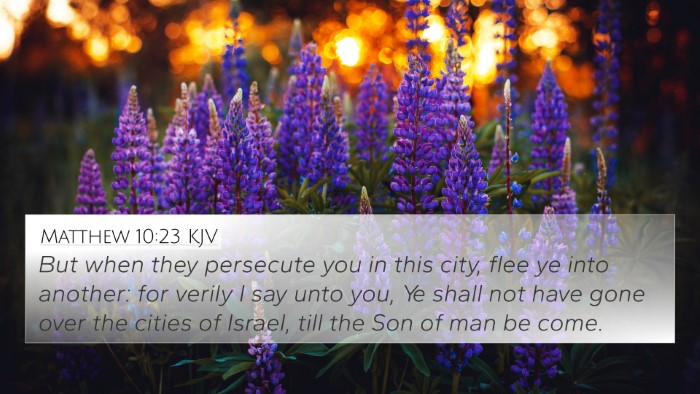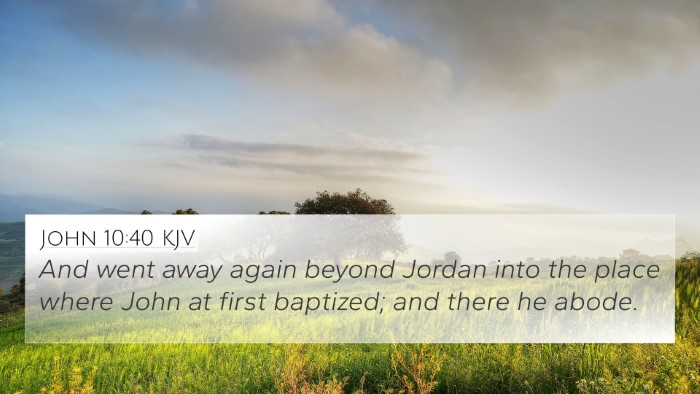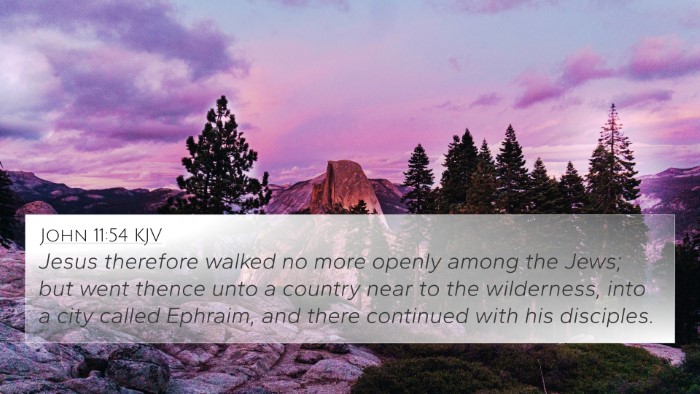Bible Verse Meaning: John 4:3
Verse: "He left Judea and departed again to Galilee." (John 4:3)
Meaning Overview: In this simple yet profound statement, we observe the geographical movement of Jesus as He transitions from Judea to Galilee. This movement is instrumental in understanding the broader narrative of His ministry, showing His intention to reach out beyond the Jewish community and towards the Gentiles.
Commentary Insights
This verse is a pivotal moment within the Gospel of John as it marks a shift in Jesus' ministry. Different biblical commentators provide valuable insights into its meaning:
-
Matthew Henry:
Henry emphasizes that Jesus' departure signifies a strategic move to avoid conflict with the Pharisees, which allows His ministry to flourish elsewhere. His departure reflects wisdom and foresight in fulfilling His mission without haste.
-
Albert Barnes:
Barnes points out that the movement to Galilee is not just geographic, but also thematic, suggesting a reaching out to those in need of spiritual truth. This underscores the mission of Jesus as inclusive and universal.
-
Adam Clarke:
Clarke highlights that this journey indicates the beginning of a more expansive ministry. He notes the importance of geographical locations in scripture, explaining that moving to Galilee shows Jesus’ desire to spread the message of hope widely.
Bible Verse Cross-References
John 4:3 intersects with several important verses throughout the Bible, enhancing our understanding through cross-references:
- Matthew 4:12: "Now when Jesus heard that John had been put in prison, He departed to Galilee." - A direct link to Jesus’ early ministry in Galilee.
- Luke 4:14-15: "Then Jesus returned in the power of the Spirit to Galilee..." - This emphasizes Jesus' empowerment and preaching in Galilee.
- John 1:43: "The following day Jesus wanted to go to Galilee, and He found Philip..." - This indicates Jesus' intention and calling of His first disciples in Galilee.
- Mark 1:14: "Now after John was put in prison, Jesus came to Galilee, preaching the gospel of the kingdom of God." - Another essential reference showing the continuity of Jesus' mission in Galilee.
- John 7:1: "After these things Jesus walked in Galilee; for He did not want to walk in Judea..." - Reflects His reasons for staying away from Judea during this time.
- Matthew 28:7: "And go quickly and tell His disciples that He is risen from the dead; and indeed He is going before you into Galilee..." - This shows the significance of Galilee in post-resurrection appearances.
- Acts 1:11: "Men of Galilee, why do you stand gazing up into heaven?" - Points to the identification of Jesus and His followers with the region of Galilee.
- Isaiah 9:1-2: "Nevertheless, the gloom will not be upon her who is distressed, as when at first He lightly esteemed the land of Zebulun and the land of Naphtali..." - A prophetic reference to Galilee's significance in Jesus' ministry.
Interpretative Aspects
Understanding John 4:3 involves recognizing the deeper connections between scripture:
Linking Bible Scriptures
The movement of Jesus from Judea to Galilee illustrates His ministry's intention to break social barriers. It invites reflection on:
- How do Jesus' actions challenge societal norms of the time?
- What does this signify about the inclusivity of His message?
John 4:3 serves as a window into the broader narrative of Христос' outreach and His strategic choices that open doors for deeper engagement with diverse communities.
Thematic Verse Connections
By studying John 4:3, we can utilize various tools for Bible cross-referencing to explore the following themes:
- Ministry Geography: The significance of location in Jesus' ministry.
- Conflict Avoidance: Jesus' wisdom in ministry strategy.
- Inclusivity: The nature of Jesus’ mission reaching beyond the Jewish community.
This verse encourages readers to delve into the texts and discern how Jesus’ geographical and ministerial choices influence understanding of His mission and impact. Reflecting on these points can enhance one's spiritual study and application of biblical teachings.
Conclusion
John 4:3, while a brief mention of Jesus' movement, invites profound reflections on ministry strategy, social engagement, and the nature of divine mission. Through cross-referencing biblical texts, we can appreciate the nuances of Jesus' approach and how it resonates with the overarching themes of the Gospel.










